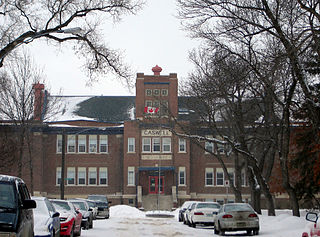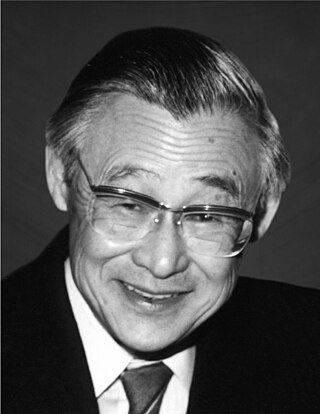
Postgraduate education, graduate education, or graduate school consists of academic or professional degrees, certificates, diplomas, or other qualifications usually pursued by post-secondary students who have earned an undergraduate (bachelor's) degree.

The University of Saskatchewan is a Canadian public research university, founded on March 19, 1907, and located on the east side of the South Saskatchewan River in Saskatoon, Saskatchewan, Canada. An "Act to establish and incorporate a University for the Province of Saskatchewan" was passed by the provincial legislature in 1907. It established the provincial university on March 19, 1907 "for the purpose of providing facilities for higher education in all its branches and enabling all persons without regard to race, creed or religion to take the fullest advantage". The University of Saskatchewan is the largest education institution in the Canadian province of Saskatchewan. The University of Saskatchewan is one of Canada's top research universities and is a member of the U15 Group of Canadian Research Universities.
The Doctor of Education is a research or professional doctoral degree that focuses on the field of education. It prepares the holder for academic, research, administrative, clinical, or professional positions in educational, civil, private organizations, or public institutions. Considerable differences exist in structure, content and aims between regions.
The Master of Social Work (MSW) is a master's degree in the field of social work. It is a professional degree with specializations compared to Bachelor of Social Work (BSW). MSW promotes macro-, mezzo- and micro-aspects of professional social work practice, whereas the BSW focuses more on direct social work practices in community, hospitals and other fields of social services. In some countries, such as Australia, the United Kingdom and Hong Kong SAR, some MSW degrees are considered equivalent to BSW qualifications as a qualifying degree.

The University of Regina is a public university located in Regina, Saskatchewan, Canada. Founded in 1911 as a private denominational high school of the Methodist Church of Canada, it began an association with the University of Saskatchewan as a junior college in 1925, and was disaffiliated by the Church and fully ceded to the university in 1934; in 1961 it attained degree-granting status as the Regina Campus of the University of Saskatchewan. It became an autonomous university in 1974. The University of Regina has an enrolment of over 15,000 full and part-time students. The university's student newspaper, The Carillon, is a member of CUP.

Albert Wesley "Al" Johnson was a Canadian civil servant, a former president of the Canadian Broadcasting Corporation, a professor in the Department of Political Science at the University of Toronto, and an author.
The Doctor of Public Administration (D.P.A.) is a terminal applied-research doctoral degree in the field of public administration (a part of public service). The D.P.A. requires significant coursework beyond the masters level and a dissertation that contributes to theory or practice. Upon successful completion, the title of "Doctor" is awarded and the post-nominal letters of D.P.A. or DPA can be used.

The Lyndon B. Johnson School of Public Affairs is a graduate school at the University of Texas at Austin that was founded in 1970. The school offers training in public policy analysis and administration in government and public affairs-related areas of the private and nonprofit sectors. Degree programs include a Master of Public Affairs (MPAff), a mid-career MPAff sequence, 16 MPAff dual degree programs, a Master of Global Policy Studies (MGPS), eight MGPS dual degree programs, an Executive Master of Public Leadership, and a Ph.D. in public policy.
The Master of Public Health(MPH), Master of Science in Public Health (MSPH), Master of Medical Science in Public Health (MMSPH) and the Doctor of Public Health (DrPH), International Masters for Health Leadership (IMHL) are interdisciplinary professional degrees awarded for studies in areas related to public health. The MPH degree focuses on public health practice, as opposed to research or teaching. Master of Public Health programs are available throughout the world in Schools of Public Health, Programs in Public Health, Medical Schools, and Schools of Public Affairs. MPH degrees, in addition to including a core curriculum, will usually also let students pursue a specialization in a specific field, such as epidemiology, biostatistics, or health management.
The Doctor of Health Administration (D.H.A.) is a doctoral degree focused with the development of theoretical knowledge in health administration and on the applied application of the said knowledge in the field of health administration. The D.H.A. requires significant coursework beyond the master's level and often requires a dissertation or capstone project that contributes to knowledge or practice.

The Edward J. Bloustein School of Planning and Public Policy of Rutgers University serves as a center for the theory and practice of urban planning, public policy and public health/health administration scholarship. The school is located in New Brunswick, New Jersey, and was named in honor of the former Rutgers University president, Edward J. Bloustein. Through its academic programs and research centers, the Bloustein School engages in instruction and research, combined learning and application. The school's strengths and the specializations of its faculty are vast and many of its faculty members are the founders of theories or practices that are now commonplace in urban planning and policy. Areas of expertise for Bloustein faculty members include transportation planning and the environment, urban and community health, workforce development, and social justice.

A public policy school or school of public affairs is typically a university program, institution, or professional school of public policy, public administration, political science, international relations, security studies, management, urban planning, urban studies, intelligence studies, global studies, emergency management, public affairs, nonprofit management, criminology, and the sociology of law.

The McCourt School of Public Policy is one of ten constituent schools of Georgetown University in Washington, D.C. The McCourt School offers master's degrees in public policy, international development policy, policy management, data science for public policy, and policy leadership as well as administers several professional certificate programs and houses fifteen affiliated research centers. The McCourt School has twenty-one full-time faculty members, ten visiting faculty members, more than one-hundred adjunct faculty members and approximately 450 enrolled students across the various degree and executive education programs.

Education in Saskatchewan, Canada, teaches a curriculum of learning set out by the Government of Saskatchewan through the Ministry of Education. The curriculum sets out to develop skills, knowledge and understanding to improve the quality of life. On June 22, 1915, Hon. Walter Scott, Premier and Minister of Education, set out as his mandate the "purpose of procuring for the children of Saskatchewan a better education and an education of greater service and utility to meet the conditions of the chief industry in the Province, which is agriculture". Education facilitates the cultural and regional socialization of an individual through the realisation of their self-potential and latent talents. Historically, the region of Saskatchewan needed successful homesteaders so the focus was to develop a unified language for successful economic trading, and agricultural understanding to develop goods, livestock and cash crops to trade. After the mechanized advancements following the industrial revolution and World War II, the primary employment agriculture sector of farming was not as labour-intensive. Individuals focused on secondary industries such as manufacturing and construction, as well as tertiary employment like transportation, trade, finance and services. Schools became technologically more advanced and adapted to supply resources for this growing demand and change of focus.

University of Saskatchewan has over 200 academic programs on its Saskatoon, Saskatchewan campus, and is internationally known for its teaching and research. The on-campus synchrotron Canadian Light Source makes it the only Canadian institution for such nuclear and biotechnology research. Canadian Light Source nuclear research facility provides research and analysis of the internal structures of advanced materials and biological samples. The College of Arts and Science is the largest of the U of S and comprises five separate health science fields in addition to numerous other programs in the Arts, Social Sciences, Humanities, and Natural Sciences. The Department of Computer Science as well as the College of Engineering are ranked highly within their fields. The founding college, the College of Agriculture, is still providing agricultural breakthroughs which are utilized worldwide.

Thomas Kunito Shoyama was a prominent Canadian public servant who was instrumental in designing social services in Canada, especially Medicare.

Higher education in Canada includes provincial, territorial, Indigenous and military higher education systems. The ideal objective of Canadian higher education is to offer every Canadian the opportunity to acquire the skills and knowledge necessary to realize their utmost potential. It aspires to cultivate a world-class workforce, enhance the employment rate of Canadians, and safeguard Canada's enduring prosperity. Higher education programs are intricately designed with the perspective of the learner in focus, striving to mitigate risks and assure definite outcomes.

The Bush School of Government & Public Service is an academic college of Texas A&M University founded in 1997 under former President George H. W. Bush's philosophy that "public service is a noble calling." Since then, the Bush School has continued to reflect that notion in curriculum, research, and student experience and has become a leading international affairs, political science, and public affairs institution.

A Doctor of Law is a doctorate in legal studies.

Warren Steinley is a Canadian politician, who was elected Member of Parliament for the riding of Regina—Lewvan in the 2019 Canadian federal election. He represents the riding of Regina—Lewvan in the House of Commons as a Member of the Conservative Party.
















